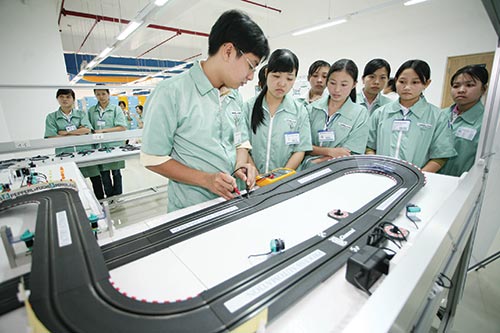EU investments stymied

A falling euro means smaller investments in Vietnam from Eurozone countries
Photo: Le Toan
The EU is among the largest sources of foreign direct investment inflows into Vietnam, with figures from the Ministry of Planning and Investment revealing that EU firms had registered to invest in 1,566 projects in Vietnam as of the end of December 2014, worth some $19.1 billion.
Vietnam was eagerly anticipating a flood of European investments following the near conclusion of a lucrative bilateral free trade agreement. Late last year, Prime Minister Nguyen Tan Dung even toured a series of EU nations including Germany, Belgium and Italy seeking investment opportunities in Vietnam. But if the Eurozone continues to be dogged by problems, this will hamper investment inflows in Vietnam.
“The substantial devaluation of the euro against the US dollar has already made European products very competitive against those coming from other areas, especially those whose currency is linked to the US dollar, including Vietnam,” said Tomaso Andreatta, vice chairman of the European Chamber of Commerce (EuroCham) which has more than 700 European corporate members.
In mid-January, the euro dropped to an 11-year low against the US dollar after the Swiss National Bank made a decision to stop buying euros to anchor the Swiss franc.
Analysts believe the euro will keep on depreciating, pushing the Eurozone back into crisis like in 2009, with the threat of deflation. The situation currently suggests the European Central Bank may have to implement quantitative easing to spur economic growth.
Andreatta, who is also head of Intesa Sanpaolo Bank’s office in Ho Chi Minh City, said the investments from the Eurozone became more expensive in Vietnam. “An investment decided last year will see an automatic adjustment, as it was decided in terms of euro, so now, once translated into Vietnam dong, it is smaller,” he said.
In addition, Andreatta believed companies in the Eurozone were now poorer in terms of US dollars and they may decide to postpone or review investments previously planned.
Last but not least, the incentives for European business to outsource products from Vietnam has reduced, as the Vietnam dong is linked to the US dollar and has appreciated, thereby reducing the attractiveness of Vietnam’s low labour costs.
“There are parts of Europe with relatively low labour costs like Portugal or Romania, where productivity is higher than Vietnam and they are very close to the core of the EU market, which will now be considered as first choice for new production facilities for sales in Europe,” said Andreatta.
However, the current Eurozone crisis can only inhibit investments from this zone to Vietnam in the short term, given the potential growth in this market and EU monetary authority policies that could boost European economies.
“The overall economic development is affected by disappointing growth in the Eurozone and the geopolitical events. However, following extensive reforms, we can say that Europe and the euro are in better and more stable shape. The euro countries are undertaking comprehensive reforms,” said Thomas Hundt, director of Germany Trade and Invest in Vietnam.
Hundt believed European businesses would strengthen their competitiveness by investing in countries with the highest comparative advantage. The comparative advantages between European countries and Vietnam arise from differences in factor endowments or technological progress.
“There are still many potential gains to be made from free trade and open investment conditions between Vietnam and the EU. The upcoming Vietnam-EU free trade agreement will boost European investments in Vietnam in the long term. Other attractive factors for European investments this year are the expected accelerated Vietnamese GDP growth and today’s excellent business climate among European companies in Vietnam,” he added.

